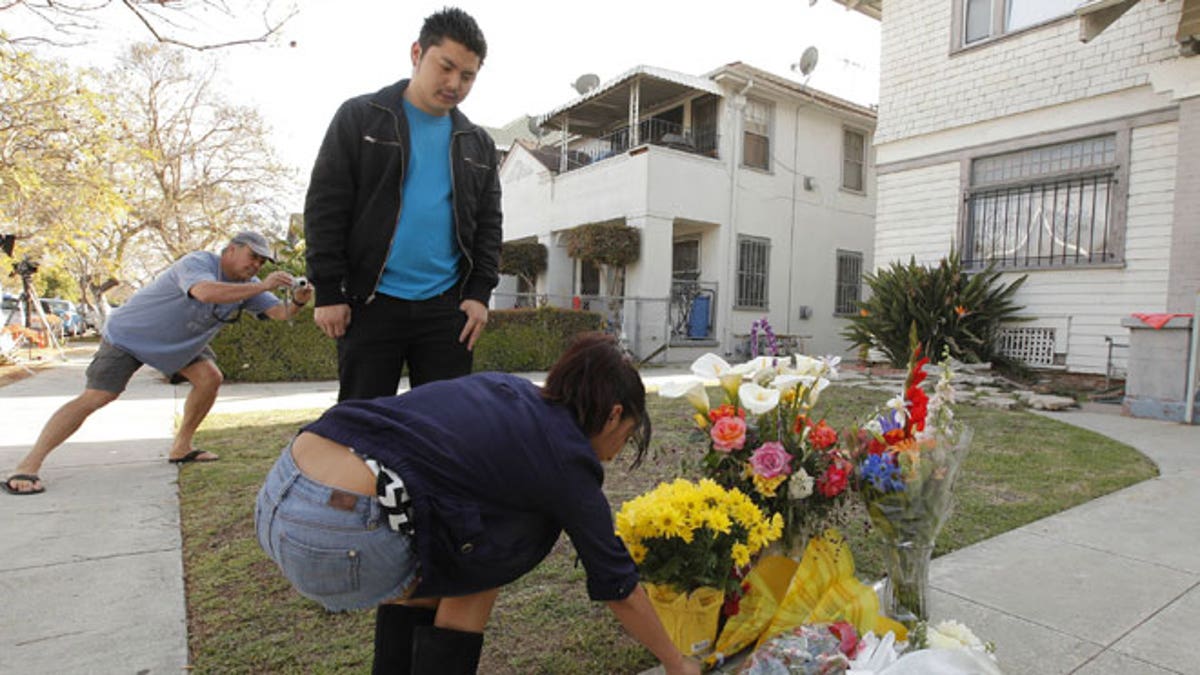
April 11, 2012: Neighbors Araceli Van Dine, right, and Derek Van Dine, middle, bring flowers to the site of the slayings of two USC graduate students early Wednesday in Los Angeles. (AP)
LOS ANGELES – Ming Qu was a day shy of his 24th birthday and had plans to return to China at the end of the semester to work.
Ying Wu was progressive and thoughtful, friends said, always up for being part of a good gag.
Both had traveled from Beijing last spring like many international students had before them, eager to earn their master's degree in electrical engineering at the University of Southern California yet somewhat wary of what life in Los Angeles would provide.
A portrait of the pair emerged Thursday as police tried to locate the gunman who killed the students while they sat in a BMW in the midnight rain about a mile from campus.
Investigators said the attack on Wednesday might have been part of a robbery or attempted carjacking, but other possibilities have not been discounted.
No arrests have been made, and police were looking at video surveillance tapes taken from cameras in the neighborhood to see whether the footage contains any new evidence. Police have not yet released a description of the gunman who fled on foot.
A press conference has been set for Friday when authorities plan to announce a $125,000 reward for information leading to the arrest and conviction of the shooter.
The shooting garnered attention half a world away as China's state television repeatedly played a report from Los Angeles with one of its reporters examining the crime scene. Speculation swirled on China's social media sites, saying the two students were from affluent families because of the BMW that some media outlets reported as being newly purchased.
The Chinese public is acutely sensitive to a widening gap between rich and poor.
Some Chinese students at USC opted not to attend a candlelight vigil because they were upset by the portrayal on social media that Qu and Wu were indifferent rich students, according to Neon Tommy, a news website sponsored by USC's Annenberg School for Communication and Journalism.
"Actually the two of them were very frugal," Wu's friend Jia Silu told the website. "Wu shared a room with another girl to save rent. Those who said the BMW was $60,000 have no conscience. It is a total lie."
Silu said the pair often studied late at night, spending most of their time at the library. He added that Wu, 23, gave herself the nickname "Sister Pig Feet" but she recently changed it to "Sister Ox Feet," he told the website.
Adam Bobrow, a former USC theater major, called Wu open-minded and considerate and was stunned to learn she had been killed.
"She's the most harmless person. She never does anything to put herself in danger's way. I can't imagine a more peaceful, pleasant person," Bobrow told the website.
Both Wu and Qu were on track to graduate in December, according to school officials.
Clay Dube, executive director of the USC-China Institute, said he spoke to the victims' parents on behalf of the university and they were shocked and devastated by the phone call.
"The families have invested so much in these children, so much love, so much hope, and the children know that. They know the expectation is they will come here and succeed," Dube said.
China sent nearly 160,000 students to U.S. universities last year, more than four times the number 15 years ago and more than any other country, according to the U.S.-based Institute of International Education. Chinese students account for nearly 22 percent of international students, who contribute more than $21 billion to the U.S. economy through tuition and living expenses.
At USC, the international student presence is enormous — it has the largest number of any university in the U.S. Roughly 19 percent of the school's 38,000 students are from overseas, including 2,500 from China.
The university also is providing counseling and other support to students traumatized by the shooting.
Officials also answered safety related questions on the university's website Thursday posted by concerned students.
Although police said violent crime had decreased 20 percent this year, some students questioned whether the school could do more to protect them once they leave campus.
"I do worry because we get a lot of crime alerts but we never actually catch the criminals," said Jessie Cai, 21, also an engineering student from China.
The school's Office of International Services provides a guide for off-campus housing for students and recommends they live in areas patrolled by campus police for safety reasons.
USC is in an urban center within a mile of gang-infested neighborhoods that have been plagued by high crime. The last time a USC student was killed near the campus was when Bryan Frost, 23, of Eagle, Idaho, was stabbed in September 2008.
___
AP Writers Shaya Tayefe Mohajer in Los Angeles and Didi Tang in Beijing contributed to this report









































